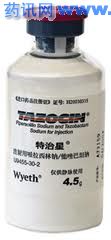【药品名称】 TAZOCINWHAT IS IN THIS MEDICINE?
WHAT DOES THIS MEDICINE DO? Piperacillin belongs to the group of medicines known as 'broad spectrum penicillin antibiotics'. It can kill many kinds of bacteria. Tazobactam can prevent some bacteria becoming resistant to the effects of piperacillin. This means that some bacteria, which are normally not killed by piperacillin, are killed when piperacillin and tazobactam are given together. Tazocin is used to treat bacterial infections such as those affecting your chest, urinary tract, blood, abdomen or skin. Tazocin may also be used with medicines known as 'aminoglycosides' to treat infections in patients who are unable to fight infections normally. BEFORE RECEIVING THIS MEDICINE If the answer to any of the following questions is 'yes' you should tell your doctor as this medicine may not be suitable for you. - Are you allergic to Tazocin, or have you had allergic reactions to antibiotics known as penicillins or cephalosporins, or to medicines called beta-Iactamase inhibitors (ask your doctor if you are not sure?) - Is the patient aged 12 years or under? Not all infections in children may be treated with Tazocin. - Are you pregnant think you might be pregnant or are breast feeding? - Do you have kidney or liver problems, or do you receive haemodialysis treatment? Your doctor may check how well your kidneys are working before he gives you this medicine and you may have regular checks whilst taking your medicine. - Do you have low levels of potassium in your blood or are you taking diuretics (for heart problems or high blood pressure) or drugs for cancer (ask your doctor if you are not sure)? Your doctor might take a blood sample from time to time for testing. - Are you on a low sodium diet? - Are you taking any other medicines, including those you have bought without a prescription? In particular, probenecid (for gout), medicines to thin your blood or to treat blood clots (e.g. heparin, warfarin or aspirin), or a drug called methotrexate (for cancer, arthritis or psoriasis). You should also tell your doctor if you are going to have a general anaesthetic. If you are being treated for gonorrhoea, you should be tested for syphilis before taking Tazocin. RECEIVING THIS MEDICINE Your doctor will give Tazocin to you by slow injection or through a drip into one of your veins. The usual adult dose of Tazocin is 4.5g given every 8 hours. However, your doctor will decide on the exact dose depending on the severity of your infection. Children aged 2-12 years may receive a lower dose for infections in or around the abdomen. (The usual dose for children is 112.5mg per kg of body weight every 8 hours, up to the adult dose). If your body cannot fight infections well, Tazocin may be used in combination with another drug, called an 'aminoglycoside', which will also be given into one of your veins. In this case, the usual dose of Tazocin is 4.5g every 6 hours. However, your doctor may give a lower dose to children aged 12 years and under. (The usual dose for children is 90mg per kg of body weight every 6 hours, up to the adult dose). If you are given Tazocin in combination with an 'aminoglycoside', the two drugs should not be given to you in the same syringe or drip. You will be given Tazocin until the signs of infection have disappeared and then treatment will usually be continued for a further 48 hours to make sure the infection has gone completely. If you have kidney or liver problems, your doctor may need to adjust the dose of Tazocin or how often it is given. Your doctor may also want to test your blood to make sure that your treatment is working, especially if you take Tazocin for a long time AFTER RECEIVING THIS MEDICINE As well as helping with your illness, Tazocin may cause unwanted side effects in some patients. If you experience persistent bloody diarrhoea, a severe allergic reaction (seen as swelling of the face or extreme difficulty breathing), widespread redness of the skin, or severe peeling of the skin, tell your doctor or nurse immediately. The most common side effects are diarrhoea, skin rashes, and feeling or being sick. You may experience pain, swelling, warmth or redness around the site of injection. More rarely, you may experience abnormal bruising and bleeding, itching, an itchy rash, eczema or other types of skin reactions, mild allergic reactions and super-infections (usually seen as thrush), increased sweating, fever or hot flushes, muscle pain or weakness, pain in the joints, headache, twitching, convulsions, tiredness, inability to sleep, hallucinations, dry or sore mouth, mouth ulcers, water retention, heartburn, abdominal pain or discomfort, constipation, soft or loose stools. Unwanted effects of Tazocin that you may not be aware of whilst taking your medicine include low blood pressure (seen as dizziness on standing), inflammation of the veins, changes in the number of red or white blood cells or platelets, or the levels of potassium, glucose or protein in your blood; temporary increases in levels of liver enzymes or bilirubin in the blood, changes in liver function (causing yellowing of the skin or whites of your eyes, itchy skin, darker urine and paler stools), or, rarely, changes in kidney function. During your treatment you may have some tests to measure any changes. If you experience any of these effects, or any other symptoms not listed above, please contact your doctor or nurse. STORING THIS MEDICINE |



